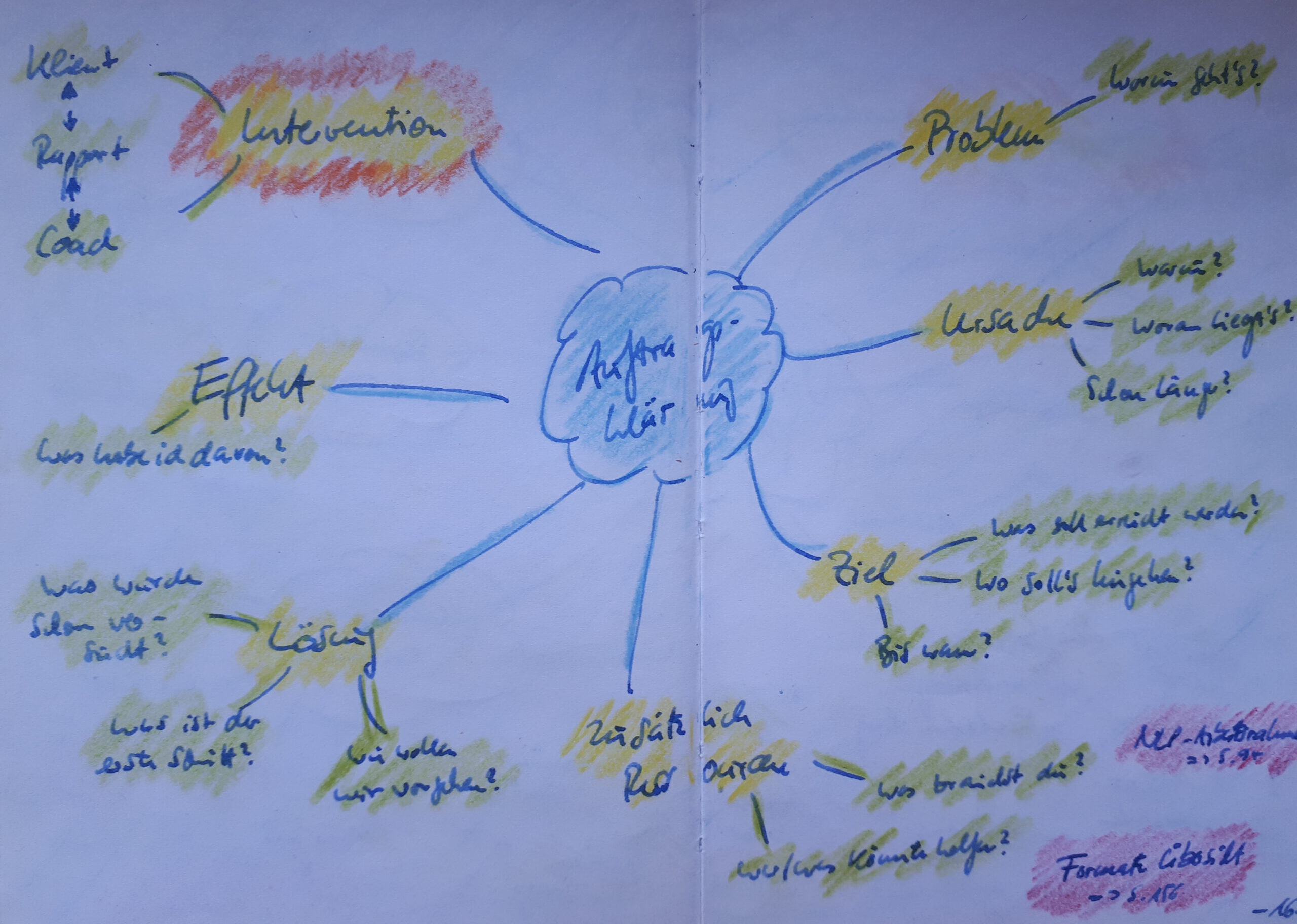
A colleague just asked me if I could help him clarify the assignment. It is about organizing an initial workshop for a consulting project, for which there is quite a little information. And it is rather basic.
So I rummaged again in my “Cloud Book of Wisdom”. It’s a book where I collect mindmaps to help me keep important things (or at least those that strike me as such at the moment).
Here’s the scribble, I was looking for (it’s German):

And this is what came out of it:
From: edgar@rodehack.de <edgar@rodehack.de>
Sent: Tuesday, March 2, 2021
To: XXX
Subject: Ideas for your phone call with the client
Hi!
As promised, here are a few questions that I would ask a client if I were you. You still know very little about the client’s specific situation. Therefore, these are pretty classic questions for clarifying the assignment:
In General
To decide how to proceed, I would first like to know the following in general
1. Problem
What exactly is the problem? What is the problem(s) to be solved? (In the management, in the team, with both, somewhere else?) Please describe as concretely as possible! Exemplary situations etc.
2. Cause
- Why does the problem exist at all? What is the context?
- What is the reason that problems exist? And also in this form?
- How long has this been going on? What are the recent developments?
3. Goal
- What should be achieved? Agile management, teams and or suppliers?
- In what direction should it go?
- Until when?
- Which milestones are conceivable or already envisaged?
4. Solution Approaches
- Obviously, the client is already doing a bit with the topic. What has already been done (training, coaching, agile projects, etc.)? Where do the teams and colleagues stand? What has worked well, what not so well?
- Specifically: to what extent is background knowledge and concrete agile experience already available? How much can/must we assume? Where might there still be something to do?
- How do the clients think, hope, wish that the joint solution path with us looks like?
5. Outcome
What would be the ideal outcome? What are the ideas about a successful project? What has been achieved in concrete terms? Where does the group stand then?
6. Resources
- What would have to happen for this — from the client’s point of view!!! — happen?
- What would be helpful — from the client’s point of view!!! — helpful?
In Preparation for the workshop
From my point of view it would help a lot if your contact person answers these questions:
- Expectation management: From the client’s point of view: What will ideally be covered in the workshop? Which topics should be covered? Which ones are better left out? What would be the super-ideal and hyper-satisfying outcome of the workshop? What does it take? (As I said: Everything from the client’s point of view!) What role is assigned to you as an external? More like consulting. Rather accompaniment? Rather moderation? Rather…?
- Dream Team: Who participates — from the client’s point of view! — ideally participate? Who is better not to participate? Why?
- Extended Dream Team: Are there participants who would also be important, but whom you are not thinking of at the moment? Perhaps also “unpleasant”, i.e. critical and powerful contributors?
- “Water Corpses”: Are there topics that, in an ideal world, would also be best worked on right now, but are perhaps mined terrain right now? What is the story behind them?
- About the project: Do the participants know about it? On a scale of 1 (blank) to 10 (enlightened)?
- Is there a consensus on the goals? Are there conflicting interests? What can you, do you need to adjust to for facilitation?
- To what extent do the participants have experience in online collaboration or online workshops? Which tool will be used? Which tools are allowed, which are prohibited?
These are the questions I would ask to find out and decide how much facilitating, activating or guiding input or moderation is needed. So, that’s my 5 cents.
Hope this is helpful.
Best regards,
Edgar